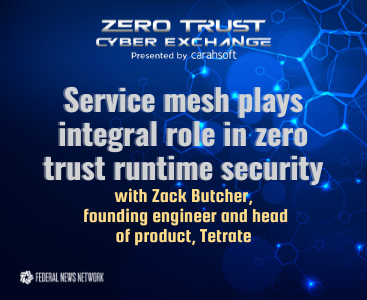
Zero Trust Cyber Exchange 2022 sessions on demand
Did you miss our 2022 Zero Trust Cyber Exchange? No worries. You can watch sessions on demand and read articles featuring zero trust leaders from OMB and CISA —...

Our exchange is a wrap, but the insights and tips on how to achieve zero trust live on.
Below you can watch sessions from Federal News Network’s inaugural Zero Trust Cyber Exchange on demand and read articles featuring cybersecurity leaders from across the government and industry.
Our team of editors delve into the status of government efforts to stand up zero trust architectures, how OMB and CISA plan further guidance, what it takes to move from network-centric to identity-centric access management, how agencies are tackling the cultural shift, the capabilities in new tools and more.
Hover over each card below to access that session’s video and article.
Day 1

“You can’t just be a CISO and implement something like this. It just impacts the organization too broadly.” — Chris DeRusha

“Moving toward … least privilege, strong recurrently validated authentication, locking down credentials … is really a sea change.” — Eric Goldstein

“We have to make sure that users can within a couple of clicks … get access to the things that are meaningful to them.” — Sean Frazier

“If you’re using identity as your perimeter, it brings in a lot of new tools … to make real-time, dynamic, threat-informed decisions.” — Louis Koplin

“One of the very first things that should be done that organizations often overlook is ensuring that they understand what's on their network today.” — Chris Usserman

“We perform webinars to look at zero trust concepts in the form of doing deep dives into the individual pillars.” — John Simms

“We’ve taken this intersection between the data and the user, and identified it as the ‘workspace.” — Jay Leask

“The place where you make decisions about who gets access to what … needs to be as close to the resource as possible.” — Steve Schmalz
Day 2

“The acceptance of the model has happened a lot quicker in the last two years than I would have expected.” — Kevin Bingham

“What excites me the most about zero trust is it’s really the most transformative strategy … shift we’ve had in cyber in the last several decades.” — Cameron Chehreh

“Everyone’s zero trust implementation plan should be different … because everyone’s not starting from the same starting point.” — Sheena Burrell

“A zero trust solution … takes a lot of the tools, techniques and functionality that they have in their enterprise today.” — Tim Jones

“Before you get into all the cool technology … that everybody loves, you really have to focus on establishing your program.” — Stephen Haselhorst

“Everything that’s requesting data or exchange of data, you certainly would need to start there. That would be a first phase.” — Andrew Osborn

“I can have a discussion on zero trust with anybody, from someone in the CTO or CIO space, but also other organizations ... like procurement.” — Dan Carroll
Day 3

“We have to implement zero trust in a way that every packet, every piece of data, every transaction is not trusted.” — Raju Ranjan

“There’s a clear opportunity to build better, build faster, be more flexible and deliver more secure systems.” — Nick Miller

“Zero trust is not really solving a technology problem. It’s really aimed at solving a business problem.” — James Yeager

“We are embracing automation. There’s just no ifs, ands or buts about that.” — Mike Witt

“Make sure that everyone across teams is hearing that same information of what benefits zero trust brings to an agency.” — Danny Connelly

“If users find zero trust cumbersome, they’re going to find workarounds — it’s human nature — and that undermines the goals and the protections.” — Bill Wright
Additional content

“What’s critical is that context-aware access determinations happen at wire speed so there’s no friction for an agency’s end users but lots of friction for bad actors.” — Sean Frazier

“The service mesh is incredibly effective for runtime security, and for being able to monitor and assert the state of your system continuously.” — Zack Butcher

“Zero trust architectures are enabled by design principles that make use of both macro and micro segmentation." — Tom Van Meter
Copyright © 2025 Federal News Network. All rights reserved. This website is not intended for users located within the European Economic Area.
Related Stories




